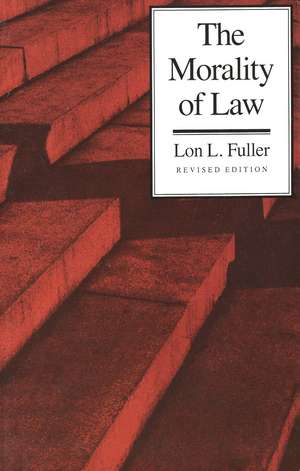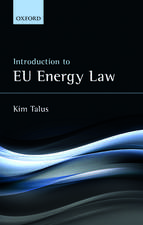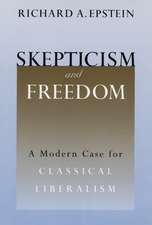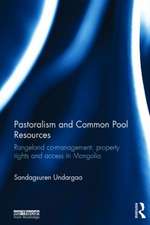The Morality of Law: The Storrs Lectures Series
Autor Lon L. Fulleren Limba Engleză Paperback – 10 sep 1965
In
a
lengthy
new
concluding
chapter
labeled
"A
Reply
to
Critics,"
Lon
L.
Fuller
extends
and
clarifies
his
definition
of
the
relation
between
law
and
morality
put
forward
in
the
first
(1964)
edition
ofThe
Morality
of
Law.
His
original
argument
distinguishes
between
the
morality
of
duty
and
the
morality
of
aspiration,
both
of
which
bear
on
the
design
and
operation
of
social
institutions:
the
former
by
setting
the
necessary
preconditions
of
any
purposive
social
endeavor,
the
latter
by
suggesting
the
directions
for
such
endeavor.
In
the
revised
edition,
Fuller
takes
accurate
aim
at
the
school
of
legal
philosophy
called
the
New
Analytical
Jurists
and
continues
his
long-running
debate
with
his
major
intellectual
antagonist,
H.L.A.
Hart.
Although
the
author
calls
the
new
chapter
"A
Reply
to
Critics,"
his
expressed
reason
for
undertaking
it
indicates
that
it
is
more
than
that:
"As
critical
reviews
of
my
book
came
in,
I
myself
became
increasingly
aware
of
the
extent
to
which
the
debate
did
indeed
depend
on
'starting
points'
-
not
on
what
the
disputants
said,
but
on
what
they
considered
it
unnecessary
to
say,
not
on
articulated
principles
but
on
tacit
assumptions.
What
was
needed,
therefore,
it
seemed
to
me,
was
to
bring
these
tacit
assumptions
to
more
adequate
expression
than
either
side
has
so
far
been
able
to
do."
There
is
no
question
that
Mr.
Fuller
here
gives
the
assumptions
of
his
side
adequate
expression.
“The
volume
must
be
regarded
as
an
important
contribution
of
general
interest
to
the
study
of
the
nature
and
function
of
law…Trenchant
comment
abounds
throughout
the
book,
and
there
is
an
immense
amount
of
the
most
valuable
material
here,
as
well
as
considerable
food
for
the
thought…his
book
deserves
to
reach
a
very
wide
audience.”
–Law
Times.
“The book is a provocative one which is certain to excite much academic comment here and abroad.” –Harvard Law Record.
“Although fully intelligible to the undergraduate, this book is likely to receive its warmest reception form advanced students of the philosophy of law, who will welcome the relief provided from the frequently sterile tone of much recent work in the field.” –Choice
Preț: 171.99 lei
Nou
Puncte Express: 258
Preț estimativ în valută:
32.91€ • 35.74$ • 27.65£
32.91€ • 35.74$ • 27.65£
Carte disponibilă
Livrare economică 01-15 aprilie
Livrare express 18-22 martie pentru 18.70 lei
Preluare comenzi: 021 569.72.76
Specificații
ISBN-13: 9780300010701
ISBN-10: 0300010702
Pagini: 272
Dimensiuni: 127 x 203 x 20 mm
Greutate: 0.23 kg
Ediția:Revizuită
Editura: Yale University Press
Colecția Yale University Press
Seria The Storrs Lectures Series
ISBN-10: 0300010702
Pagini: 272
Dimensiuni: 127 x 203 x 20 mm
Greutate: 0.23 kg
Ediția:Revizuită
Editura: Yale University Press
Colecția Yale University Press
Seria The Storrs Lectures Series
Recenzii
"This
is
an
exception
in
that
it
comes
as
close
as
is
feasible
to
resenting
legal
philosophy
in
popular
form.
.
.
.
He
has
managed
the
considerable
trick
of
making
his
thoughts
palatable
and
even
entertaining."—Library
Journal
"An
important
contribution
of
general
interest
to
the
study
of
the
nature
and
function
of
law.
.
.
.
Trenchant
comment
abounds
throughout
the
book,
and
there
is
an
immense
amount
of
the
most
valuable
material
here,
as
well
as
considerable
food
for
thought."—Law
Times
"Essential
reading
for
all
who
are
interested
in
following
the
growth
of
jurisprudence
and
in
relating
it
to
the
sound
scientific
analysis
of
law."—The
Annals
"A
most
valuable
and
challenging
essay
on
the
nature
of
law."—Choice
"For
the
beginner
as
well
as
the
seasoned
student
of
legal
philosophy,The
Morality
of
Lawcontains
an
excellent
assortment
of
ideas
demanding
further
thought."—Edwin
W.
Tucker,Indiana
Law
Journal
"This
is
an
important
book. The
background
to
it
is
the
age-old
controversy
whether
the
validity
of
'law'
rests
solely
on
formal
criteria
(Positivists),
or
an
a
moral
element
in
addition
to
formal
criteria
(Naturalists). Professor
Fuller
argues
persuasively
in
support
of
the
latter."—Cambridge
Law
Journal
"Although
this
book
is
small,
its
content
is
both
deep
and
thought
provoking. It
should
be
read
not
only
by
Professor
Fuller's
colleagues
in
the
teaching
of
jurisprudence,
but
also
by
all
those
academics
and
practicing
lawyers
who
seriously
maintain
that
their
education
did
not
cease
with
law
school."—Ralph
F.
Bischoff,New
York
Law
Journal
"The
Morality
of
Lawwill
find
a
place
among
the
important
books
in
the
history
of
American
legal
philosophy.
It
includes
insights
into
the
relations
between
morality
and
law,
and
advances
a
theory
of
law
of
great
practical
relevance.
.
.
.
[This]
is
the
best
discussion
of
the
demands
of
the
rule
of
law
in
existing
literature,
.
.
.
filled
.
.
.
with
many
brilliant
insights.
.
.
.
The
book
should
be
widely
read."—Robert
S.
Summers,Journal
of
Legal
Education
"The
book
is
a
provocative
one
which
is
certain
to
excite
much
academic
comment
here
and
abroad."—Harvard
Law
Record
"To
both
students
and
scholars,
this work
is
highly
recommended.
The
author
has
opened
many
new
avenues
of
inquiry
while
dealing
with
the
many
old
questions
raised
in
any
discussion
of
morality
and
law
and
of
natural
versus
positive
law."—Gerald
W.
Johnson,
Tennessee
Law
Review
"Throughout
this
profound,
imaginative
and
keenly
analytical
work,
[Fuller]
demonstrates
his
continuing
concern
with
the
tension
in
morality
and
law
between
the
'is'
and
the
'ought'.
.
.
.
A
book
of
ideas
should
.
.
.
provoke
and
contribute
new
thoughts.
This
book
does
both."—Barry
R.
Mandelbaum,New
York
Law
Forum
Descriere
In a lengthy new concluding chapter labeled "A Reply to Critics," Lon L. Fuller extends and clarifies his definition of the relation between law and morality put forward in the first (1964) edition of The Morality of Law. His original argument distinguishes between the morality of duty and the morality of aspiration, both of which bear on the design and operation of social institutions: the former by setting the necessary preconditions of any purposive social endeavor, the latter by suggesting the directions for such endeavor.
In the revised edition, Fuller takes accurate aim at the school of legal philosophy called the New Analytical Jurists and continues his long-running debate with his major intellectual antagonist, H.L.A. Hart. Although the author calls the new chapter "A Reply to Critics," his expressed reason for undertaking it indicates that it is more than that: "As critical reviews of my book came in, I myself became increasingly aware of the extent to which the debate did indeed depend on 'starting points' - not on what the disputants said, but on what they considered it unnecessary to say, not on articulated principles but on tacit assumptions. What was needed, therefore, it seemed to me, was to bring these tacit assumptions to more adequate expression than either side has so far been able to do." There is no question that Mr. Fuller here gives the assumptions of his side adequate expression.
“The volume must be regarded as an important contribution of general interest to the study of the nature and function of law…Trenchant comment abounds throughout the book, and there is an immense amount of the most valuable material here, as well as considerable food for the thought…his book deserves to reach a very wide audience.” – Law Times.
“The book is a provocative one which is certain to excite much academic comment here and abroad.” – Harvard Law Record.
“Although fully intelligible to the undergraduate, this book is likely to receive its warmest reception form advanced students of the philosophy of law, who will welcome the relief provided from the frequently sterile tone of much recent work in the field.” – Choice

















